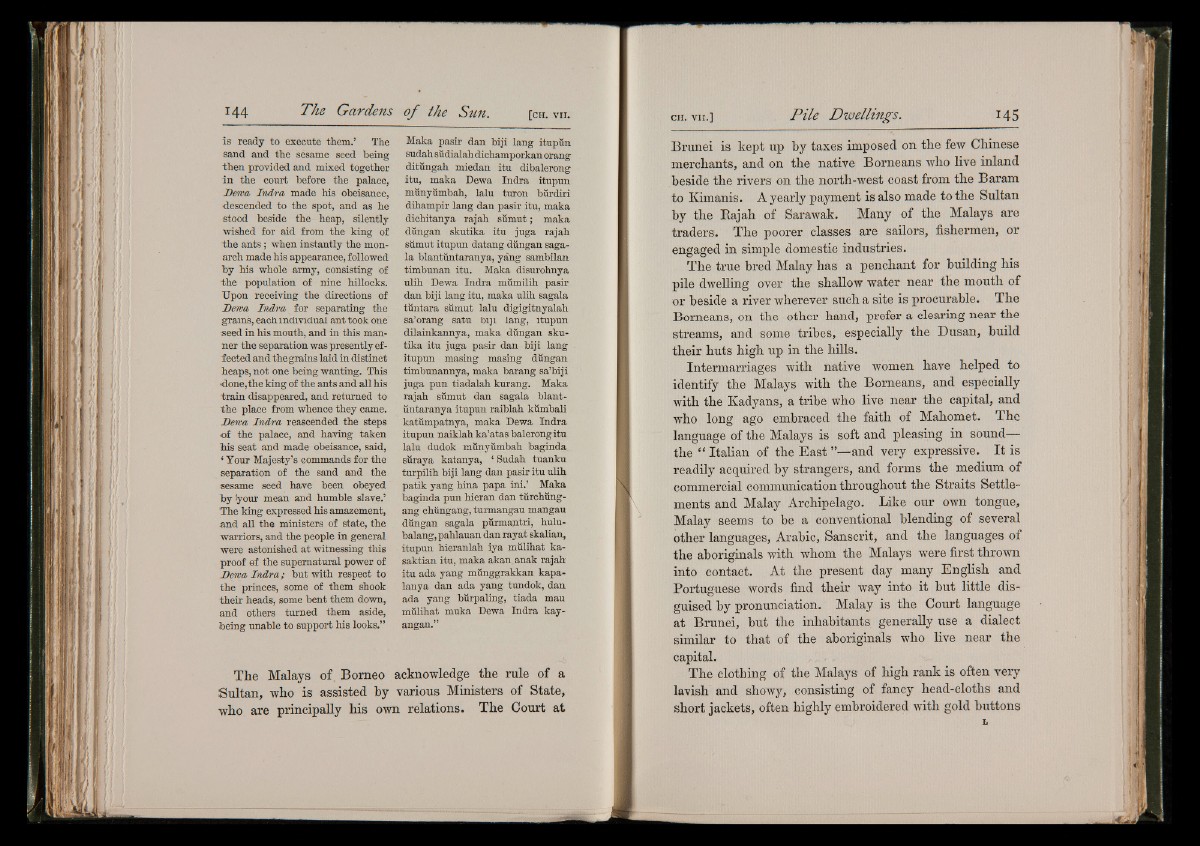
is ready to execute them.’ The
sand and the sesame seed being
then provided and mixed together
in the court before the palace,
Dewa Indra made his obeisance,
descended to the spot, and as he
stood beside the heap, silently
wished for aid from the king of
the ants; when instantly the monarch
made his appearance, followed
by his whole army, consisting of
the population of nine hillocks.
Upon receiving the directions of
Dewa Indra for separating the
grains, each individual ant took one
seed in his mouth, and in this manner
the separation was presently ef-
fected and the grains laid in distinct
heaps, not one being wanting. This
•done, the king of the ants and all his
train disappeared, and returned to
the place from whence they came.
Dewa Indra reascended the steps
■of the palace, and having taken
his seat and made obeisance, said,
* Your Majesty’s commands for the
separation of the sand and the
sesame seed have been obeyed
by lyour mean and humble slave.’
The king expressed his amazement,
and all the ministers of state, the
warriors, and the people in general
were astonished at witnessing this
proof of the supernatural power of
Dewa Indra; but with respect to
the princes, some of them shook
their heads, some bent them down,
and others turned them aside,
being unable to support his looks.”
Maka pasir dan biji lang itupün
sudah südialah dichamporkan orang
ditüngah miedan itu dibalerong
itu, maka Dewa Indra itupun
münyümbah, lalu turon burdiri
dihampir lang dan pasir itu, maka
dichitanya rajah sümut; maka
düngan skutika itu juga rajah
sümut itupun datang düngan saga-
la blantüntaranya, yäng sambilan
timbunan itu. Maka disurohnya
ulih Dewa Indra mümilih pasir
dan biji lang itu, maka ulih sagala
tüntara sümut lalu digigitnyalah
sa’orang satu biji lang, itupun
dilainkannya, maka düngan skutika
itu juga pasir dan biji lang
itupun masing masing düngan
timbunannya, maka barang sa’biji
juga pun tiadalah kurang. Maka
rajah sümut dan sagala blantüntaranya
itupun raiblah kümbali
katümpatnya, maka Dewa Indra
itupun naiklah ka’atas balerongitu
lalu dudok münyümbah baginda
süraya katanya, 1 Sudah tuanku
turpilih biji lang dan pasir itu ulih
patik yang hina papa ini.’ Maka
baginda pun hieran dan türchüng-
ang chüngang, turmangau mangau
düngan sagala pürmantri, hulu-
balang, pahlauan dan rayat skalian,
itupun hieraniah iya mülihat ka-
saktian itu, maka akan anak rajah
itu ada yang münggrakkan kapa-
lanya dan ada yang tundok, dan
ada yang bürpaling, tiada mau
mülihat muka Dewa Indra kay-
angan.”
The Malays of. Borneo acknowledge the rule of a
Sultan, who is assisted by various Ministers of State,
who are principally his own relations. The Court at
Brunei is kept up by taxes imposed on the few Chinese
merchants, and on the native Borneans who live inland
beside the rivers on the north-west coast from the Baram
to Kimanis. A yearly payment is also made to the Sultan
by the Kajah of Sarawak. Many of the Malays are
traders. The poorer classes are sailors, fishermen, or
engaged in simple domestic industries.
The true bred Malay has a penchant for building his
pile dwelling over the shallow water near the mouth of
or beside a river wherever such a site is procurable. The
Borneans, on the other hand, prefer a clearing near the
streams, and some tribes, especially the Dusan, build
their huts high up in the hills.
Intermarriages with native women have helped to
identify the Malays with the Borneans, and especially
with the Kadyans, a tribe who live near the capital, and
who long ago embraced the faith of Mahomet. The
language of the Malays is soft and pleasing in sound—
the " Italian of the East ’’—and very expressive. It is
readily acquired by strangers, and forms the medium of
commercial communication throughout the Straits Settlements
and Malay Archipelago. Like our own tongue,
Malay seems to be a conventional blending of several
other languages, Arabic, Sanscrit, and the languages of
the aboriginals with whom the Malays were first thrown
into contact. At the present day many English and
Portuguese words find their way into it but little disguised
by pronunciation. Malay is the Court language
at Brunei, but the inhabitants generally use a dialect
s im i la r to that of the aboriginals who live near the
capital.
The clothing of the Malays of high rank is often very
lavish and showy, consisting of fancy head-cloths and
short jackets, often highly embroidered with gold buttons